As we wrote at the time of the transition, this was was ill fated from the start. With Ralph hanging around, there was little chance of a new CEO getting to set his own agenda. Two years later he is gone.
http://foundertransitions.blogspot.com/2015/09/ralph-lauren-rides-his-polo-pony-into.html
Stefan Larsson, a former H&M executive and president of Old Navy, Gap brand, is taking over the helm at Ralph Lauren. Mr. Larsson is credited with reviving Old Navy, one of the a bright spot in Gap’s portfolio. (I will purposely fail to mention that the last CEO of Gap, who didn't fare nearly as well, was a kid from my hometown.)
The change is a purposeful attempt by Ralph Lauren to get its financial house in order. Recent earnings beat analyst estimates, but revenue dipped more than 5 percent, causing a precipitous drop in share price.
According to the New York Times, Mr. Lauren said that he intended to remain active at the company he founded in new roles as executive chairman and chief creative officer.
What does active mean? Mr. Larsson apparently will report to Mr. Lauren. However, Lauren described it as a partnership. “But I don’t feel like I’m stepping back now,” Mr. Lauren said.
If not stepping back, what is this change all about? If Lauren is not going to give Larsson full authority to do what is necessary to remedy the financial performance, why promote him to CEO? And the new CEO is reporting to the former one? Does that mean change is at hand, or more of the same?
It appears that the two executives come at this business from vastly different perspectives and experience. Unlike Lauren, Larsson made his mark in the low cost fashion world. Will his cost conscious views conflict with those of Ralph?
It appears that the two executives come at this business from vastly different perspectives and experience. Unlike Lauren, Larsson made his mark in the low cost fashion world. Will his cost conscious views conflict with those of Ralph?




